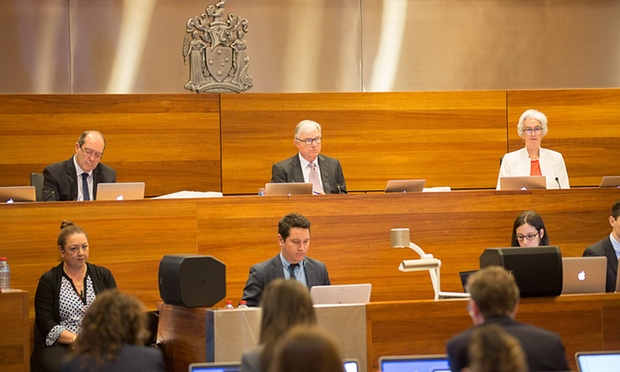Letters Show Melbourne Archbishop Failed to Act on Allegations about Priest
By Melissa Davey
A number of extraordinary letters from then Melbourne archbishop Frank Little, in response to serious allegations about behaviour towards children by parish priest Peter Searson, have been revealed by the royal commission into institutional responses to child sexual abuse. Little received a letter from a parent in 1982 concerning children who were scared of Searson, then priest of Our Lady of Carmel parish and school in Sunbury, Victoria, the royal commission heard on Thursday. “Parents have no trust in his decisions,” the parent said in the letter, adding that he had instructed his own children not to go to Searson’s office unless accompanied. The commission heard Searson was renowned for his bizarre behaviour, which included placing children on his lap during confession, and teasing, touching and belittling them. But Little responded that it was “difficult for every priest to fulfil the expectations of every parishioner entrusted to his pastoral care”. In response to another letter from parish staff that said Searson had brought a handgun to school and threatened children with it, Little responded that he was not the correct person to alert. “May I suggest most courteously and sincerely that the first person to whom your complaint should be made is the person you have accused,” Little’s letter read. “On no account should a superior act unless an accused person has had [an] opportunity to defend himself.” The commission heard that in the face of first-person accounts from senior religious and school staff about children being traumatised by Searson, particularly during their one-on-one confessionals with him, Little responded that there was no concrete evidence to compel him to act. Another letter from an assistant priest told Little that Searson’s behaviour was “so strange it’s difficult to begin”, adding that he inflicted “deep personal hurt”, engaged in the “utter humiliation of women” and frequently reduced people to tears. Little flippantly scrawled “happy days” on the top of another letter of complaint, the commission heard. Over a fortnight, the commission is focusing on eight priests within the archdiocese of Melbourne who had the most complaints against them about sexually abusing children, with the bulk of those incidents occurring between 1950 and 1989. On Thursday morning, Monsignor Thomas Doyle, who was director of the Catholic Education Office for much of the time Searson was a parish priest, gave evidence that he was aware of complaints against Searson, and he believed they were serious. Doyle said he would always refer complaints to Little. But as far as he was aware, Little never acted on those complaints, Doyle said. The chairman of the commission, Justice Peter McClellan, pressed Doyle on why he did not take the complaints elsewhere, for example to a regional bishop, given he knew Little was not taking them seriously. “You’ve got a brick wall that’s starting to emerge, you’ve got a real problem that’s obviously causing great distress for this school, which is part of your responsibility,” McClellan said. “Wouldn’t you do what you could?” Doyle replied: “Yes, we should have. I probably thought it wasn’t any use to do it.” Doyle agreed with counsel assisting, Stephen Free, that Little’s letters in response to allegations of abuse were embarrassing and patronising. Little died in 2008. Searson died in 2009, without facing any child sexual abuse charges. The commission heard the complaints against him spanned two decades, from 1977, and across the three parishes where he worked as a priest. Earlier in the week, victims gave evidence about the profound impact Searson’s abuse had on their life. Members of the public gallery erupted in applause in support as they concluded their evidence. Over the next fortnight, the commission will explore why police and internal investigations by the archdiocese into the priests took so long, and why charges were not brought earlier. The hearings will culminate in evidence from Cardinal George Pell, who was auxiliary bishop of Melbourne from 1987 to 1996. The commission heard that in 1989, a number of staff from the Holy Family parish and school in Doveton approached Pell about Searson’s conduct, including his harassment of children. On Wednesday, a former principal of the Doveton parish, Graeme Sleeman, said he referred hundreds of complaints about Searson to senior Catholic Education Office staff and religious figures, but that no action was taken. Sleeman resigned as a result and was unable to get a new job, the commission heard. Sleeman said he believed he was being punished for exposing Searson’s abuse, and told the commission that when he asked Pell for support during a telephone call, Pell hung up on him. On Wednesday, graffiti was scrawled outside the county court in Melbourne, where the hearings are taking place, accusing Pell of covering up the abuse. It was removed by Thursday. The hearings continue.
|
.
Any original material on these pages is copyright © BishopAccountability.org 2004. Reproduce freely with attribution.
